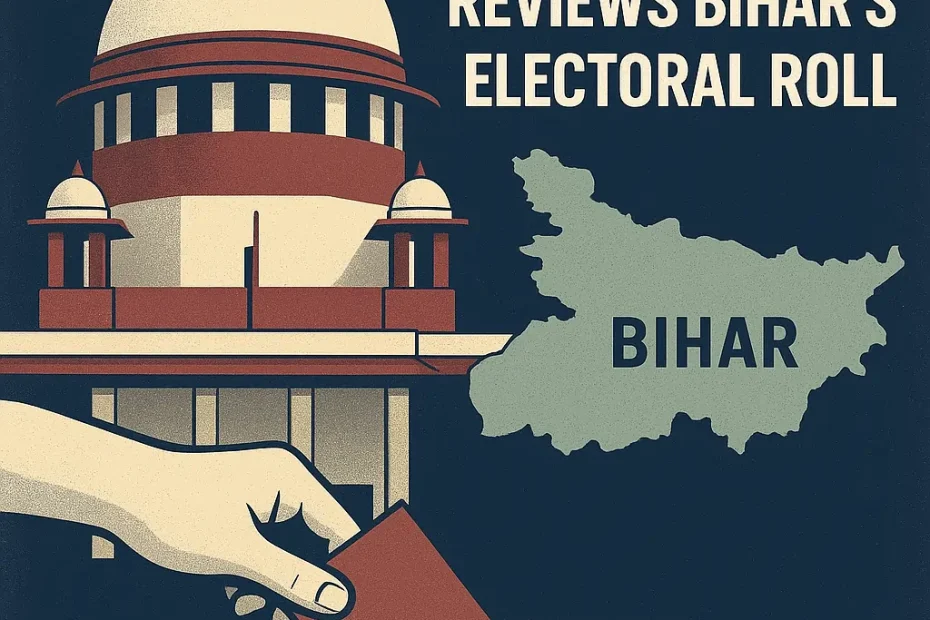In a significant move to uphold democratic principles, the Supreme Court of India has turned its attention to Bihar’s Electoral Roll and the ongoing Special Intensive Revision (SIR) process. The court has expressed concerns over the potential for mass voter exclusion, particularly in areas with alleged illegal settlements, and has warned of judicial intervention if the process undermines the right to vote. In early August 2025, this development showed that the judiciary plays a pivotal role in safeguarding electoral integrity and ensuring that authorities do not disenfranchise any eligible voter.
Background of the Issue
Election officials initiated the Special Intensive Revision (SIR) of electoral rolls in Bihar to update voter lists and ensure accurate electoral records. However, concerns have arisen over the implementation of this exercise, with petitioners alleging that the revision could disproportionately affect marginalized communities, particularly those residing in areas labeled as “illegal settlements.” These settlements, often inhabited by economically disadvantaged groups, have raised questions about potential voter suppression, prompting legal challenges to the SIR’s validity.
The Supreme Court’s intervention comes in response to petitions filed before it, which argue that the revision process lacks transparency and risks excluding eligible voters. The court’s scrutiny underscores the delicate balance between maintaining accurate voter rolls and protecting the fundamental right to vote enshrined in India’s Constitution.
Supreme Court’s Stance
During recent hearings, the Supreme Court made it clear that it would closely monitor the SIR process.The bench emphasized that authorities must not engage in any mass exclusion of voters, especially if it disproportionately impacts specific communities. The court warned that it will intervene if it finds the revision violates democratic principles or disenfranchises eligible citizens. This stance reflects the judiciary’s broader commitment to ensuring free and fair elections, a cornerstone of India’s democratic framework.
The court is currently reviewing the petitions to assess whether the SIR process adheres to legal and constitutional standards. Key issues under consideration include the criteria used to identify “illegal settlements,” the transparency of the revision process, and the safeguards in place to prevent arbitrary removal of voters from the electoral rolls.
Implications for Democratic Participation
The Supreme Court’s proactive approach sends a strong message about the importance of inclusivity in the electoral process. Voter exclusion, whether intentional or procedural, can undermine the legitimacy of elections and erode public trust in democratic institutions. By addressing these concerns, the court is reinforcing the principle that every eligible citizen has the right to participate in the democratic process without fear of arbitrary disenfranchisement.
This case also highlights the challenges of balancing administrative efficiency with democratic rights. While updating electoral rolls is essential to prevent fraudulent voting, the process must be conducted with utmost care to avoid marginalizing vulnerable populations. The court’s scrutiny could set a precedent for how electoral revisions are carried out across India, ensuring that such exercises are inclusive and transparent.
Broader Context
The Bihar electoral roll controversy comes at a time when electoral integrity is a pressing issue in India. With the rise of digital voter databases and increasing scrutiny of electoral processes, concerns about voter suppression, gerrymandering, and administrative lapses have gained prominence. The Supreme Court’s involvement in this matter aligns with its history of stepping in to protect democratic rights, as seen in previous rulings on electoral reforms and voter ID processes.
Moreover, the focus on “illegal settlements” raises questions about socio-economic disparities and their impact on political participation. Many residents of such settlements belong to marginalized communities, including migrant workers and low-income families, who may lack formal documentation. The court’s intervention could pave the way for clearer guidelines on how to include such populations in the electoral process without compromising the integrity of voter rolls. You may read this also: Supreme Court Warns Himachal’s Ecological Collapse
Conclusion
The Supreme Court’s scrutiny of Bihar’s Special Intensive Revision of electoral rolls underscores its unwavering commitment to protecting democratic participation. By addressing concerns over potential voter exclusion, the court is ensuring that the electoral process remains inclusive and fair. As the case progresses, it will likely have far-reaching implications for how electoral revisions are conducted across India, reinforcing the principle that every eligible voter’s voice must be heard. This development is a testament to the judiciary’s role as a guardian of democracy, ensuring that the right to vote remains sacrosanct in the world’s largest democracy.
